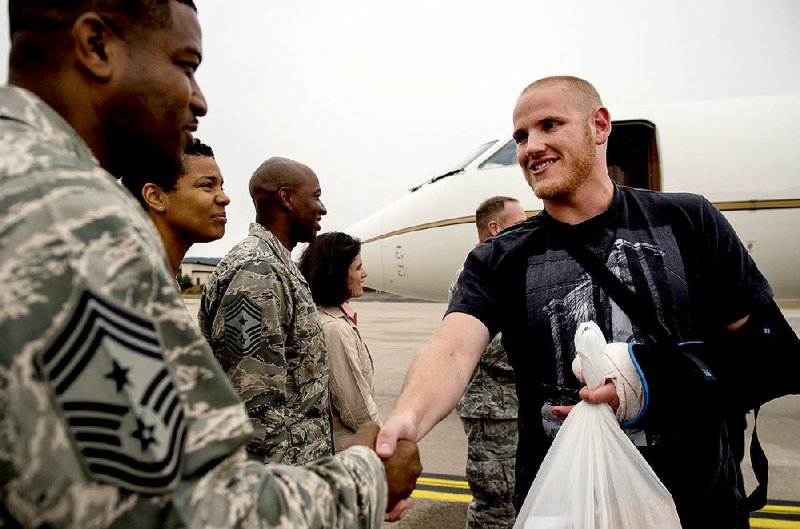PARIS -- Minutes before he slung an assault rifle across his chest and walked through a high-speed train, the Moroccan suspect in a foiled attack watched a jihadist video on his cellphone, the French prosecutor said in formally opening a terrorism investigation Tuesday.
The actions by Ayoub El-Khazzani on the Amsterdam-to-Paris train Friday night and information from other European authorities on his travels and apparent links to radical Islam prompted the investigation, said prosecutor Francois Molins.
El-Khazzani, 26, was tackled on the train and tied up by five passengers, who averted what French President Francois Hollande said "could have degenerated into monstrous carnage."
During questioning by authorities, El-Khazzani said he had no terrorism plans and had found a bag of weapons Thursday in a Brussels park and planned to use them to rob passengers, Molins said. But the suspect grew less and less lucid as he gave his explanation, the prosecutor added, and eventually stopped talking to investigators altogether.
One reason investigators suspect a premeditated attack was that El-Khazzani, who claimed to be homeless and living in a Brussels park, was traveling on a first-class ticket, Molins said. El-Khazzani refused to take an earlier train, he added, although there were seats available -- "the sign of a planned project."
He boarded the train Friday at a Brussels station, Molins said.
Besides the assault rifle, El-Khazzani had 270 rounds of ammunition, a pistol, a box cutter and a bottle of gasoline, Molins said.
Prosecutors also said they found a small explosive, such as what's used in the tips of missiles, hidden in the glass box that contains the hammer used to break train windows in cases of emergency. They did not elaborate.
"El-Khazzani watched a video of Islamic preaching onboard" on YouTube on his mobile phone shortly before he got up to start walking through the train with the weapons, Molins told reporters at a news conference. El-Khazzani's phone was found in a bag that had been left on the train.
The gunman was subdued by three American friends and a British businessman. Another man who had tried to stop him -- a French-American named Mark Moogalian -- remained hospitalized with a gunshot wound.
With the formal inquiry opened, investigating magistrates are expected to file numerous preliminary charges against El-Khazzani, including multiple counts of attempted murder in connection with terrorism, possession of weapons in connection with terrorism and participation in a terrorist conspiracy.
El-Khazzani had traveled through several European countries and had been repeatedly incarcerated in Spain and flagged for surveillance in France, Molins said. After five to seven months in 2014 in France, he lived in Brussels; Vienna; and Cologne, Germany.
French surveillance helped authorities spot him on a May 10 flight from Berlin to Istanbul, then a return flight from Antakya, Turkey, to Tirana, Albania, via Istanbul, Molins said. El-Khazzani denied going to Turkey.
He may also have tried to go to Syria, officials said.
In his speech Tuesday, the French president said the country remains "exposed" to violent extremism, and "this aggression is new proof that we should prepare ourselves for other assaults."
Hollande did not elaborate on a specific threat, although France has been on high alert for attacks all year. He stressed his commitment to counterterrorism efforts at home and abroad.
Investigators in Brussels searched two buildings in the Molenbeek-Saint-Jean neighborhood where El-Khazzani may have stayed, the federal prosecutor's office said in a statement. No one was detained, although investigators said they seized "some objects" for further examination. The statement did not elaborate.
One of the Americans who helped thwart the attack, U.S. Airman 1st Class Spencer Stone, flew to a U.S. military base in southern Germany, where he was treated at the Landstuhl Regional Medical Center and is doing well, said spokesman Chuck Roberts. Stone, who arrived Monday, seemed in good spirits, smiling and shaking hands with officials at the hospital.
Roberts said Stone is being treated for a severe cut to his thumb, for which a full recovery is expected, as well as a "noncritical" eye injury and other minor wounds. It's not clear when Stone will be transferred back to the U.S.
Anthony Sadler, a Sacramento State University student who also helped stop the attack, landed late Tuesday at Sacramento International Airport in California, according to Sacramento's KCRA-TV.
He was accompanied by his parents, and the family was escorted onto the tarmac.
Information for this article was contributed by Lorne Cook, David Risin, Angela Charlton and Johnny Clark of The Associated Press.
A Section on 08/26/2015
